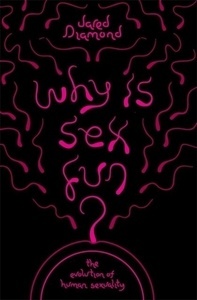Why is Sex Fun?

Resumen del libro
Why are humans one of the few species to have sex in private? Why do humans have sex any day of the month or year - including when the female is pregnant, beyond her reproductive years, or between her fertile cycles? Why are human females one of the few mammals to go through menopause?
Human sexuality seems normal to us but it is bizarre by the standards of other animals. Jared Diamond argues that our strange sex lives were as crucial to our rise to human status as were our large brains. He also describes the battle of the sexes in the human and animal world over parental care, and why sex differences in the genetic value of parental care provide a biological basis for the all-too-familiar different attitudes of men and women towards extramarital sex.
Biografía del autor
x{0026}lt;P x{0026}lt;B Jared Diamondx{0026}lt;/B (1937) es catedrático de geografía en la Universidad de California (UCLA). Comenzó su actividad científica en el campo de la fisiología evolutiva y la biogeografía. Ha sido elegido miembro de la Academia de Artes y Ciencias, de la Academia Nacional de Ciencias y de la Sociedad Filosófica de Estados Unidos, y ha recibido una beca de investigación de la Fundación MacArthur, además de los premios Burr de la Sociedad Geográfica Nacional y Pulitzer de 1998 por x{0026}lt;I Armas, gérmenes y acerox{0026}lt;/I (1997).x{0026}lt;/P x{0026}lt;P Ha publicado más de seiscientos artículos en las revistas x{0026}lt;I Discoverx{0026}lt;/I , x{0026}lt;I Natural Historyx{0026}lt;/I , x{0026}lt;I Nature y Geox{0026}lt;/I . También es autor de x{0026}lt;I El tercer chimpancéx{0026}lt;/I (1994), x{0026}lt;I ¿Por qué es divertido el sexo?x{0026}lt;/I (1999), x{0026}lt;I Colapso x{0026}lt;/I (2006), x{0026}lt;I El mundo hasta ayerx{0026}lt;/I (2013) y x{0026}lt;I Sociedades comparadasx{0026}lt;/I (Debate, 2016) grandes éxitos que han obtenido, además, numerosos galardones.x{0026}lt;/P








